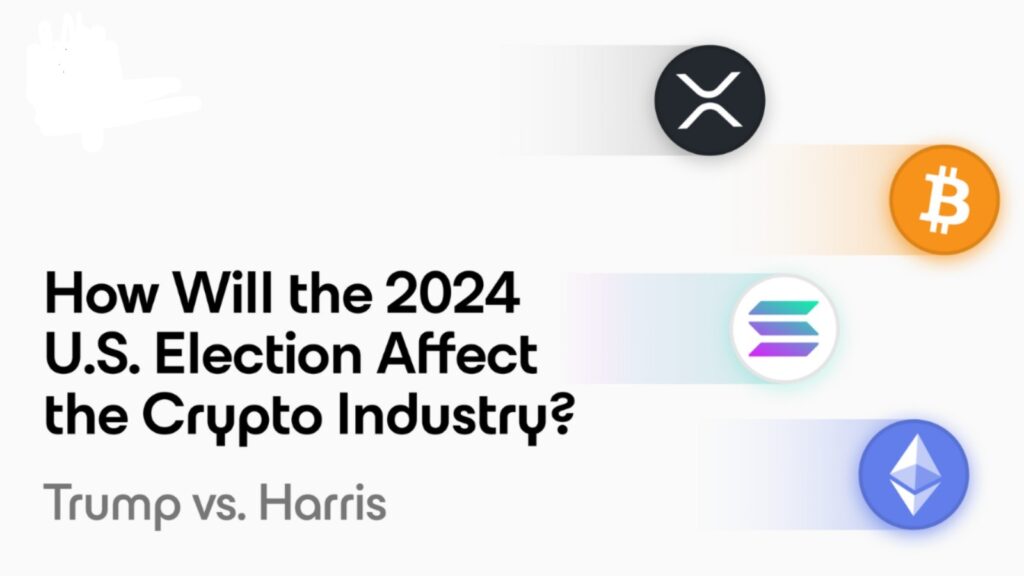As we enter “Uptober”—a term coined in the crypto space to describe the historical pattern of Bitcoin and other digital assets performing well in October—many traders are looking ahead to how the upcoming U.S. presidential election could impact the crypto market. The election is poised to be one of the most critical political events for the future of digital assets, with crypto traders already speculating on the potential outcomes if Donald Trump or Kamala Harris wins the presidency.
In this blog, we’ll explore what each candidate’s victory could mean for the crypto market, how traders are placing their bets, and why October is a crucial month for cryptocurrencies.
1. Trump vs. Kamala: Who Are Crypto Traders Betting On?
As the 2024 U.S. election approaches, crypto traders are already taking sides, speculating on how a victory for either Donald Trump or Kamala Harris could shape the market.
Donald Trump—known for his outspoken views on Bitcoin—has previously referred to cryptocurrencies as a “scam” and stated that he doesn’t like them. However, during his presidency, the crypto market thrived, largely due to an environment of deregulation, tax cuts, and fiscal policies that spurred financial growth. Many crypto traders believe a Trump win could bring back a similar pro-business, pro-growth stance, which could foster further institutional adoption and investment in crypto. Additionally, some argue that Trump’s skeptical stance on centralized digital currencies could delay the rollout of a U.S. CBDC (Central Bank Digital Currency), preserving the decentralized nature of the crypto industry for a while longer.
Kamala Harris, on the other hand, has a more progressive agenda. If she wins, her administration is likely to continue the regulatory scrutiny of crypto that began during the Biden era. However, some analysts believe that a Harris presidency could bring about more regulatory clarity, which, while potentially increasing compliance costs for crypto businesses, could also reduce uncertainty for investors. Moreover, a Kamala Harris win could fast-track the U.S. government’s adoption of a CBDC, which may coexist with or even compete against stablecoins like USDT and USDC.
In short, a Trump victory might mean more resistance to regulation, which could create a bullish environment for Bitcoin and other cryptos, while a Kamala Harris win could introduce more stringent oversight but provide a clearer regulatory framework that institutional investors might appreciate.
2. Uptober: Why October is Critical for Crypto Markets
Before we delve further into election scenarios, let’s address the significance of “Uptober” in the crypto community. Historically, October has been a month of positive price movements for Bitcoin and other digital currencies. Over the past decade, October has often delivered solid returns for Bitcoin, with traders coining the term “Uptober” to capture this trend.
Some reasons for this trend include:
- Seasonal Investor Behavior: After the typically slow summer months, October often sees a surge in investor activity as markets prepare for end-of-year rallies.
- Macro Factors: The final quarter of the year tends to bring major developments in global markets, including fiscal policies, corporate earnings reports, and geopolitical events, all of which can drive positive momentum in the crypto space.
- Market Sentiment: October marks the start of the “last leg” of the year, with institutional investors often increasing exposure to risk assets like crypto to meet their annual performance targets.
In 2024, this month is especially pivotal as it sets the stage for how the market will react to the U.S. election, which could either propel the markets further or cause a pullback depending on the outcome.
3. How a Trump Win Could Impact the Crypto Market
If Donald Trump wins the 2024 U.S. presidential election, the crypto market could see a mixed reaction. On one hand, Trump’s skeptical stance on crypto suggests that he might push for regulatory restrictions, especially on cryptocurrencies like Bitcoin and Ethereum. However, Trump is known for his pro-business policies and tax cuts, which could benefit high-net-worth individuals and corporations—leading to increased investment in Bitcoin as a hedge against inflation and government intervention.
Key factors under a Trump presidency could include:
- Less Interest in CBDCs: Trump has expressed skepticism about centralized digital currencies, which could delay the rollout of a U.S. CBDC and give decentralized cryptos more room to flourish.
- Pro-Business Policies: Trump’s focus on deregulation and low taxes might create a favorable environment for crypto-related businesses and institutional investments.
- International Trade Policies: Trump’s potential continuation of trade wars or tariffs could push countries toward adopting cryptocurrencies as a way to bypass traditional financial systems. This could especially benefit Bitcoin, which is often used as a cross-border asset.
While Trump has been critical of cryptocurrencies, his administration could indirectly support the market through policies that encourage innovation, investment, and a hands-off approach to regulation.
4. How a Kamala Harris Victory Could Reshape Crypto
Kamala Harris represents the continuity of the Biden administration’s policies, which have been characterized by regulatory crackdowns on certain areas of the crypto market. However, she also brings the possibility of creating a more structured and transparent regulatory environment.
Here’s how her win might affect crypto:
- Faster Regulatory Clarity: The current regulatory ambiguity surrounding crypto assets has been a significant barrier for institutional investors. A Harris administration could push for clearer guidelines, providing more legitimacy to the crypto sector.
- Support for a CBDC: Kamala Harris is likely to continue the push for a Central Bank Digital Currency (CBDC), which would give the government greater control over digital finance. While this could create competition for private stablecoins, it could also help promote digital currency adoption on a broader scale.
- Environmental Concerns: The Biden administration has taken a strong stance on climate change, and a Harris presidency could bring further scrutiny to the energy-intensive nature of Bitcoin mining. This might lead to stricter regulations on Bitcoin mining operations, especially in the U.S.
For crypto traders, Kamala Harris presents a trade-off: more regulation could limit certain speculative activities, but it could also stabilize the market by attracting institutional investors who prefer a clearer legal framework.
5. The Role of Stablecoins and CBDCs in Election Policies
Both Trump and Harris are likely to influence the future of stablecoins and the development of a CBDC. Stablecoins like USDT (Tether) and USDC (USD Coin) have been critical to the crypto ecosystem, allowing traders to move in and out of volatile assets seamlessly.
A Trump administration may take a more laissez-faire approach, allowing stablecoins to continue dominating the crypto market with less government interference. Meanwhile, a Harris administration might take steps to regulate stablecoins more strictly or promote a government-backed CBDC to challenge them. For the global market, including Kenya, the introduction of a U.S. CBDC could revolutionize cross-border payments and remittances, further integrating crypto into everyday transactions.
6. Regulatory Environment: A Turning Point for Crypto?
The most immediate impact the U.S. election is likely to have on the crypto market is through changes in the regulatory environment. Over the past few years, the U.S. government has been inching towards more stringent crypto regulation. The Securities and Exchange Commission (SEC), led by Gary Gensler, has been particularly aggressive in labeling certain crypto assets as securities, which has spurred a number of high-profile lawsuits, such as the one against Ripple.
If the election brings in an administration with a more crypto-friendly stance, it could pave the way for clearer regulatory guidelines, reducing uncertainty in the market. On the flip side, a government that pushes for heavier regulation might dampen innovation and push companies to seek more accommodating jurisdictions, such as Dubai or Singapore.
Some key questions that the new administration will need to address include:
- Is Bitcoin a commodity or a security?
- Will stablecoins like USDT and USDC face heavier regulation?
- How will the government regulate decentralized finance (DeFi) platforms and protocols?
- Will tax policies on crypto transactions change?
A pro-crypto administration could ease some of these concerns, potentially spurring a new wave of institutional investment, while a stricter regulatory regime could create headwinds for the market.
7. Monetary Policy and Inflation: How Will the Federal Reserve Respond?
Another crucial factor that will determine how the U.S. election affects the crypto market is monetary policy. Cryptocurrency, particularly Bitcoin, has often been viewed as a hedge against inflation. The Federal Reserve’s interest rate decisions have a direct impact on the value of the U.S. dollar, and by extension, the entire financial ecosystem, including crypto.
If inflation remains a central issue during and after the election, the incoming government will likely influence how the Federal Reserve tackles it. A government that supports continued interest rate hikes could lead to a stronger dollar, which might weaken demand for Bitcoin and other cryptocurrencies as inflation hedges. On the other hand, a government that prioritizes fiscal spending and monetary easing might encourage more capital to flow into cryptocurrencies as investors seek alternative stores of value.
Kenyan traders and crypto enthusiasts should keep a close eye on these developments. A weakening dollar could potentially increase the value of crypto assets, but it could also lead to greater volatility in emerging markets as currencies adjust to global monetary shifts.
8. Institutional Adoption: Policy Clarity Could Accelerate Investment
Institutional interest in cryptocurrency has surged in recent years, with major companies like MicroStrategy, Tesla, and even traditional financial institutions such as BlackRock entering the space. However, much of this interest has been tempered by regulatory uncertainty. The outcome of the U.S. election could either fuel or stifle further institutional adoption depending on how the new administration approaches crypto.
If the next U.S. government provides clear and favorable guidelines for institutional involvement in crypto, we could see an influx of institutional capital, driving market growth. Companies might feel more confident holding crypto on their balance sheets, and financial institutions might accelerate the rollout of Bitcoin ETFs, stablecoin-backed financial products, and blockchain-based innovations.
For the Kenyan market, institutional adoption in the U.S. could further legitimize cryptocurrencies, encouraging more local businesses, fintech startups, and investors to embrace digital assets. It would also create a more stable investment environment for crypto, attracting more global partnerships and venture capital into African blockchain projects.
9. Geopolitical Ramifications: The U.S. Election and Global Crypto Adoption
The U.S. remains a global economic powerhouse, and its political decisions often have a ripple effect worldwide. If the new administration adopts a supportive stance toward crypto, it could inspire other countries to follow suit or at least reconsider their stances on digital currencies. Alternatively, a hostile stance could embolden regulators in other regions to crack down on cryptocurrencies.
Africa, with its young population and high mobile money penetration, has significant potential for crypto adoption. If the U.S. sets favorable standards, this could accelerate crypto usage across the continent, including in Kenya, where digital currencies like Bitcoin and Ethereum are already gaining traction.
Additionally, the U.S. election may influence geopolitical factors such as trade relations, sanctions, and international payments, areas where cryptocurrencies and blockchain technology could play a role in the future. For instance, countries facing U.S. sanctions, such as Russia and Iran, have turned to crypto as a way to bypass the traditional financial system. A new U.S. administration might take a tougher stance on this, potentially affecting crypto liquidity in certain regions.
10. Stablecoins and CBDCs: Competing for Dominance
Stablecoins, such as USDT, USDC, and BUSD, are a cornerstone of the crypto market, providing a stable alternative to volatile cryptocurrencies. However, stablecoins have come under increasing scrutiny from regulators, who argue that they could pose risks to financial stability if not properly regulated.
In parallel, central bank digital currencies (CBDCs) are being explored by many governments, including the U.S., as a state-controlled alternative to stablecoins. Depending on the outcome of the U.S. election, we might see faster progress on the development and implementation of a digital dollar.
A pro-crypto administration might work to regulate stablecoins without stifling innovation, while a more conservative government could prioritize the development of a CBDC over private stablecoins, potentially reducing their role in the market. For Kenya, this could affect the flow of cross-border transactions, particularly for remittances, which are a significant part of the economy.
11. Impact on Bitcoin ETFs and Retail Access
The U.S. election could also have a direct impact on the approval and growth of Bitcoin exchange-traded funds (ETFs), which allow traditional investors to gain exposure to Bitcoin without actually holding the asset. While some ETFs have already been approved, more clarity is needed, and a more crypto-friendly government could open the door to additional ETF products.
For retail investors in Kenya and beyond, more Bitcoin ETFs would likely mean greater access to crypto investments through traditional brokers and exchanges. This would lower the barrier to entry for everyday investors, making it easier to participate in the crypto market without the complexities of setting up digital wallets and exchanges.
Final Thoughts: What Should Crypto Investors Expect?
As the U.S. 2024 election looms, crypto investors should brace for increased volatility and uncertainty in the market. The outcome of the election could shape the regulatory, monetary, and geopolitical landscape for years to come.
For Kenyan crypto enthusiasts, this is a critical moment. The potential for institutional adoption, clearer regulations, and monetary policy shifts could create new opportunities for investors, traders, and businesses alike. Staying informed and understanding how global events like the U.S. election could impact the local market is key to navigating these uncertain times.
Ultimately, whether the next U.S. administration takes a hardline stance on crypto or embraces it as part of the financial future, the ripple effects will be felt around the world—including in Africa, where crypto continues to grow as a tool for financial inclusion and innovation.
Conclusion
As the U.S. election unfolds, both seasoned and new crypto investors should be vigilant about the impact it could have on the market. Watching regulatory trends, market sentiment, and the overall geopolitical climate will be crucial to making informed investment decisions in the months ahead.
ENG WANJIKU
Views: 10




